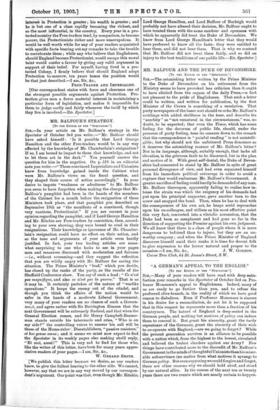MR. BALFOUR'S STRATEGY.
[To THE EDITOR OF THE " SPECTATOR."'
SIR,—In your article on Mr. Balfour's strategy in the Spectator of October 3rd you write :—" Mr. Balfour should have asked himself : Is it possible that Lord George• Hamilton and the other Free-traders would be in any way affected by the knowledge of Mr. Chamberlain's resignation ? If so, I am bound to impart to them that knowledge, and not to let them act in the dark. " You yourself answer the question for him in the negative. On p. 518 in an editorial note you write :—" Those convinced Imperialists and Unionists knew from knowledge gained inside the Cabinet what were Mr. Balfour's views on the fiscal question, and they shaped their course of action accordingly." In your desire to impute "weakness or adroitness" to Mr. Balfour yon seem to have forgotten when making the charge that Mr. Balfour's pamphlet had been in the hands of the members of • the Cabinet for a month before the resignation of these Ministers took place, and that pamphlet you described on September 19th as " the manifesto of a convinced, though very cautious, Protectionist." If you are correct in your opinion regarding the pamphlet, and if Lord George Hamilton and Mr. Ritchie are Free-traders by conviction, then, accord- ing to your own showing, they were bound to send in their resignations. Their knowledge or ignorance of Mr. Chamber- lain's resignation could have no effect on their action, and so the tone and arguments of your article seem hardly justified. In fact, your two leading articles are some- what surprising to one who looks to see in your pages men and measures discussed with moderation and fairness —i.e., without screaming—and they suggest the reflection that you are wildly angry with Mr. Balfour for saving the situation. The Prime Minister's "lead," which you deride, has closed up the ranks of the party, as the results of the Sheffield Conference show. You say of such a lead : " Ce teat pas magnzfigue, and also ce n'est pas la guerre." That is as it may be. It certainly partakes of the nature of "warlike operations." It keeps the enemy out of the citadel, and though you think the affairs of the nation would be safer in the hands of a moderate Liberal Government, very many of your readers see no chance of such a Govern- meat, and agree rather with Sir Barrington Simeon that the next Government will be extremely Radical, and that when the General Election comes, and Sir Hemy Campbell-Banner- man stands outside his tabernacle and cries, " Who is on my side 13" the controlling voices to answer his call will be those of the Home-ruler.. Disestablishers, "passive resisters," et hoc genus OW143 ; and it seems we must now expect to find the Spectator in its weekly pages also making shrill reply, "Et moi, aussi!" This is very sad to find for those who, like the writer of this letter, have been for many years appre- ciative readers of your pages.—I am, Sir, be., •
W. GERARD SMITH.
[We publish this letter because we desire, as our readers know, to give the fullest hearing to the other side. We cannot, however, say that we are in any way moved by our correspon- dent's-argument. Our point was that, eveathough Mr. Ritchie, Lord George Hamilton, and Lord Balfour of Burleigh would -probably not have altered their decision, Mr. Balfour ought to have treated them with the same candour and openness with which he apparently did treat the Duke of Devonshire. We know from Lord George Hamilton's letter that they would have preferred to know all the facts : they were entitled to hear them, and did not hear them. That is why we contend that Mr. Balfour did not treat them fairly, and so did an injury to the best traditions of our public life.—ED. Spectator.]














































 Previous page
Previous page